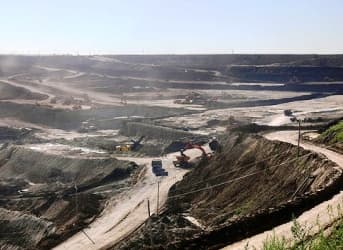Mongolia boasts huge deposits of coal, cooper, gold, uranium and many other rare minerals, and is opening up its vast resources to the world; this has however led to many diplomatic problems for the Asian nation.
Mongolia is unfortunately situated between Russia and China, and with no coast it relies on passing through these two countries; routes which Moscow and Beijing make Mongolia pay dearly for.
Currently the development of the world’s largest coal deposit at Tavan Tolgoi is being discussed, with international investors vying to get a share of the riches buried beneath the earth. One easy option would be to work exclusively with China on the mining of the coal, since nearly all of the coal will end up there anyway. However, Mongolia are reluctant to give China so much control over an important industry and revenue earner due to the fear that it will give the People’s Republic large political influence in Ulan Bator.
To avoid this situation the Mongols have spent years expertly playing a diplomatic game as they consider who should be granted the rights to develop an estimated 900-million-ton portion of the deposit, much of it prized coking coal essential for making steel. They must find a way to keep the Chinese and Russians happy, whilst at the same time not giving them enough power to politically influence the running of the country in the future.
The two main bidders at the moment are Shenhua Energy, a Chinese state-owned enterprise, and Peabody Energy, a multinational mining giant from St. Louis. As part of the constant rivalry between Washington and Beijing, the US is firmly supporting the bid from Peabody, whilst China increases its own diplomatic pressure to force the selection of Shenhua.
Mongolia knows that it is already vulnerable to China’s near monopoly over its exports, and as a solution has turned to the US for support, expanding cooperation between the two nations. The US has provided hundreds of millions of dollars in aid to Mongolia, as well as providing other forms of support, including granting thousands of visas to Mongolian students wishing to learn in the US. Mongolia must be careful though, because now that they have got into bed with the US, the US will expect payment, and they have their eye on Tavan Tolgoi.
As Puntsag Tsagaan, a presidential advisor on mining, admitted, “we are a small country sandwiched between two elephants. We can’t go to war and fight, so we have to secure our economic growth through diplomacy.”
One reason that Ulan Bator may be fretting, is that whatever decision they make someone is going to be left out. With two superpowers such as the US and China, who both hold reasonable influence over the small country, wanting to be given the lead role in the new project, Mongolia is going to have to say no to one of them and risk making a diplomatic enemy. Just last year when information about the discussions was leaked revealing that Peabody and China were destined to be the primary winners on Tavan Tolgoi, Russia, Japan and South Korea were outraged. To avoid any further situations the negotiations were put on hold until after the parliamentary elections.
The elections are due to be held tomorrow, at which point China and the US are bound to demand an answer. Who will Mongolia choose? The US seem to be in a strong position due to the close relationship they have been building over the years, but does Mongolia really want a scorned China sitting on their doorstep, especially considering the power that China has over other important Mongolian industries.
ADVERTISEMENT
By. Charles Kennedy of Oilprice.com



















There will be many in Asia and esp. in Mongolia who see China as the rising power and the US as the declining power. Put these two considerations together, and China, as with Russia in Europe will most likely edge into a position of advntage.
At worst, China could if she were so inclined take Mongolia by force in a day, and nobody could prevent her. The potential is worth far more in terms of 'diplomacy' than anything the US can offer. I wouldn't be surprised if China already had a 'hot line' to Mongolia anyhow.
If China should want to 'play' the US in Mongolia, she would be playing virtually on home ground. Just as the Russians played the US in Central Asia. Anywhere in North Asia is either Russian or Chinese 'territory'.
The US enters this arena at great risk and ultimately little long term reward, except where Russia or China might see an advantage in a US presence.